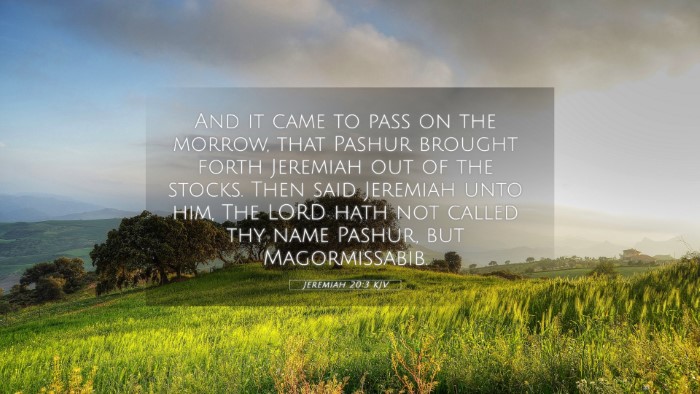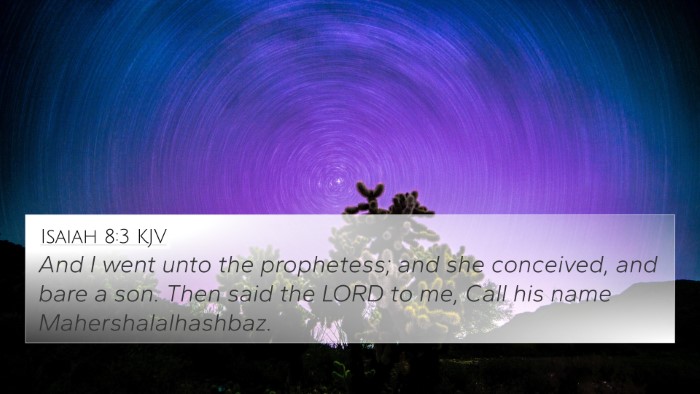Understanding Jeremiah 20:3
Jeremiah 20:3 states: "And it came to pass on the morrow, that Pashur brought forth Jeremiah out of the stocks. Then said Jeremiah unto him, The Lord hath not called thy name Pashur, but MagOR-missabib."
This verse captures a pivotal moment in the life of the prophet Jeremiah, highlighting his suffering and the divine message he was entrusted to deliver.
Summary of Jeremiah 20:3 Meaning
The verse illustrates the tension between the prophet Jeremiah and the priest Pashur, who represents institutional religion at the time.
Jeremiah's message from God contradicts the popular sentiments, leading to conflict and persecution.
Key Themes and Concepts
-
The Conflict of Prophecy:
Jeremiah's encounter with Pashur exemplifies the struggle between God’s truth and the resistance from religious authorities.
This theme echoes throughout Scripture where God's messengers face opposition.
-
Divine Naming:
Jeremiah’s declaration that God has changed Pashur’s name signifies a prophetic pronouncement regarding judgment and the fate that awaits him—this reflects God's authority over human identities and destinies.
-
Persecution and Suffering:
The stocks symbolize the physical and emotional anguish faced by prophets who advocate for God's message.
This suffering is not uncommon as seen in other Biblical accounts, showcasing the cost of discipleship.
Context and Background
Jeremiah prophesied during a time of great moral decay in Judah, warnings of impending disaster because of sin.
His ministry often met with hostility, particularly from those in power who were resistant to change.
Cross References
Below are several key cross-references that relate to Jeremiah 20:3:
- Jeremiah 1:5: God’s calling of Jeremiah from the womb reflects the purpose and authority behind his prophetic ministry.
- Jeremiah 15:10: The struggles of being a prophet are highlighted here, showcasing the conflict with people and the waywardness of society.
- Isaiah 20:2-4: A similar theme of prophetic symbol and personal suffering marks Isaiah's ministry as it does Jeremiah's.
- Matthew 5:10-12: Jesus echoes the blessing on those persecuted for righteousness, connecting New Testament themes of suffering for faith.
- Acts 5:41: The apostles celebrate being found worthy to suffer shame for the name of Jesus, mirroring the experiences of Jeremiah.
- Hebrews 11:32-38: The hall of faith recounts the sufferings of prophets, demonstrating continuity in the experience of God’s messengers.
- Luke 6:22: Jesus’ words about being reviled and cast out resonate with Jeremiah's situation, linking their shared experiences of persecution.
Commentary Insights
Matthew Henry's Commentary
Matthew Henry emphasizes that Jeremiah's change of Pashur's name signifies that God can transform and upend established identities:
“The priests of the Lord may indeed be a terror to those who are disobedient, but it is for the Lord's sake, not their own.”
Henry highlights the spiritual and moral authority of God over man’s definitions.
Albert Barnes' Notes
Albert Barnes reflects on the significance of Pashur’s character, noting that he is a representation of those who resist God’s message for their own gain.
He delineates how such individuals face divine judgment, a theme pervading the prophetic literature.
Adam Clarke's Commentary
Adam Clarke provides a detailed analysis of the historical context surrounding this event, suggesting that Pashur symbolizes not just a personal adversary to Jeremiah but an embodiment of the broader issues within the Israelite community and its leaders.
Thematic Connections and Cross Referencing
Understanding Jeremiah 20:3 requires a broader exploration of thematic connections throughout the Bible.
The experiences and divine mandates of prophets establish inter-Biblical dialogues that inspire deeper insights into the nature of faith, obedience, and God’s redemptive purposes.
Conclusion
Jeremiah 20:3 remains a powerful reflection on the trials of prophetic ministry and the steadfastness required in following God's call amidst opposition.
Through careful cross-referencing and thematic exploration, believers can find encouragement in their own spiritual journeys, learning from the rich tapestry of Biblical narratives.



















